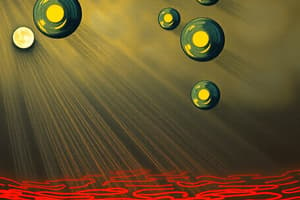Podcast
Questions and Answers
How is heat energy primarily lost from human bodies?
How is heat energy primarily lost from human bodies?
- Through radiation (correct)
- Through evaporation only
- Through conduction with surfaces
- Through convection with air
Which process involves direct contact between two objects for heat transfer?
Which process involves direct contact between two objects for heat transfer?
- Evaporation
- Radiation
- Convection
- Conduction (correct)
What is the role of sweating in regulating body temperature?
What is the role of sweating in regulating body temperature?
- It increases body temperature via sympathetic control
- It cools the body through conduction
- It helps in radiation of heat to the environment
- It facilitates heat loss through evaporation (correct)
What is a potential benefit of having a fever?
What is a potential benefit of having a fever?
How does increased body temperature affect antibody production?
How does increased body temperature affect antibody production?
Flashcards are hidden until you start studying
Study Notes
Radiation
- Emission of heat energy occurs from warm bodies as electromagnetic waves or heat waves.
- Heat waves can travel through space, facilitating heat loss.
Heat Loss in Humans
- Humans lose nearly half of their heat energy through the process of radiation.
Conduction
- Defined as the transfer of heat between objects at different temperatures that are in direct contact.
- Involves the exchange of thermal energy through physical contact.
Sweating
- An active process of evaporative heat loss regulated by the sympathetic nervous system.
- Vital for thermoregulation and maintaining body temperature.
Benefits of Fever
- Raises body temperature, which inhibits many microorganisms.
- Enhances the production of antibodies during elevated temperatures.
- Can slow down the growth of certain tumors, potentially aiding in disease management.
Studying That Suits You
Use AI to generate personalized quizzes and flashcards to suit your learning preferences.




